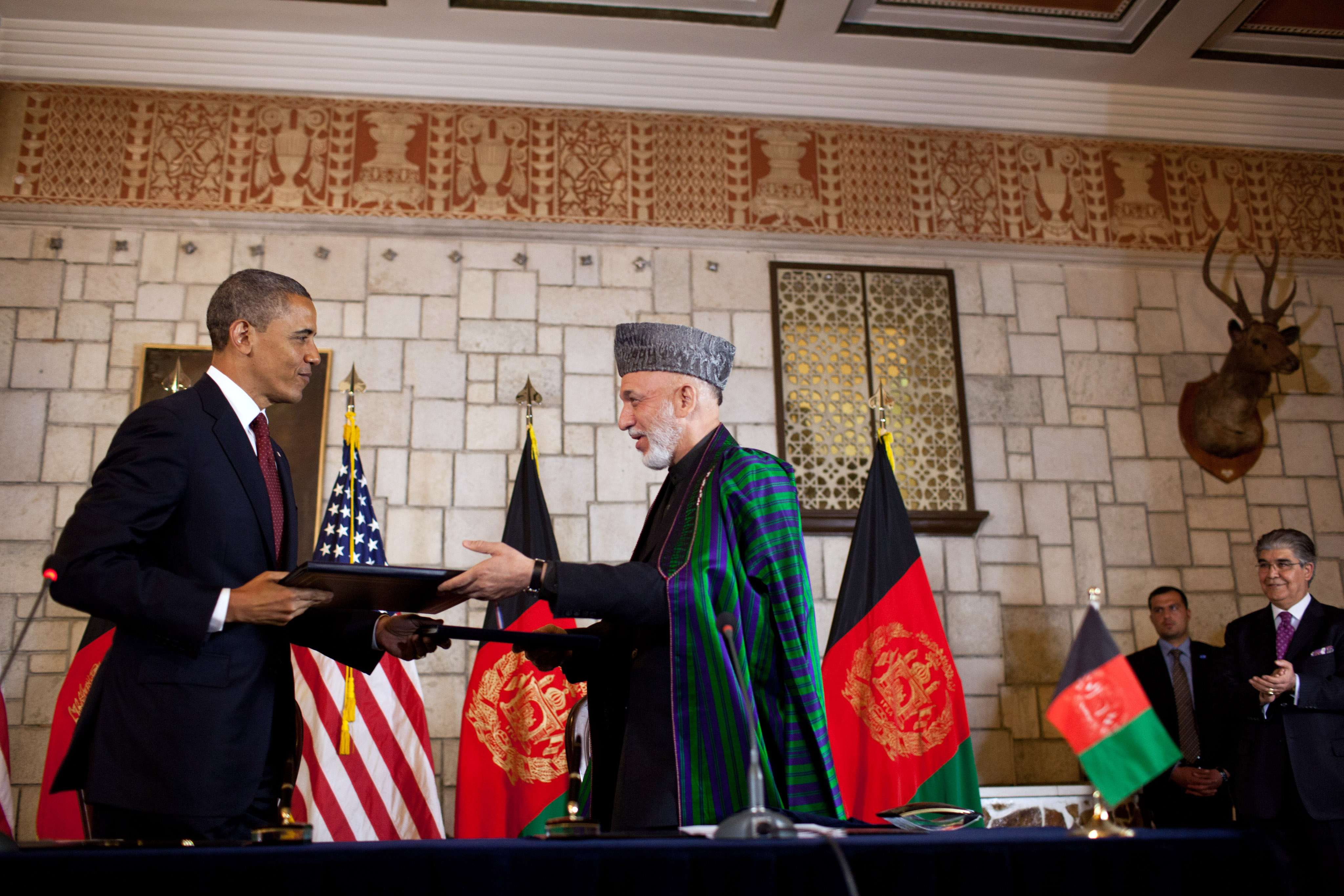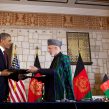
Hurdles to Peace: Afghanistan Beyond the Strategic Partnership Agreement
Publication: Terrorism Monitor Volume: 10 Issue: 10
By:

The Afghan-American “Enduring Strategic Partnership Agreement” was signed by President Barack Obama and President Hamid Karzai in Kabul on May 2. The impact this agreement will have on the Afghan conflict is not yet clear. However, it could affect Afghanistan in one of two ways. On the one hand, it could embolden the insurgents and encourage them to launch deadlier and more frequent attacks against the Afghan state with the aim of achieving a sweeping victory. On the other hand, concurrent with the withdrawal of foreign troops from Afghanistan, many among the militants could lay down their arms believing that their mission of “liberating” the country has been accomplished. This could serve as a severe blow to the military strength and morale of the insurgents. Whatever the outcome, neither of these scenarios would result in the overthrow of the Karzai regime or the complete surrender and defeat of the opposition. In other words, a light U.S. military footprint in Afghanistan as called for in the agreement is not likely to end the conflict since there are other domestic and regional issues that affect stability in Afghanistan. A criminalized economy of war, an underlying ideological rift, and lasting regional rivalries are among the key hurdles obstructing Afghanistan’s path to peace and prosperity.
Afghanistan’s geopolitical location has complicated its internal politics while affecting the nature of enmities and competition between other relatively powerful states in the region. Currently, India, Pakistan, and Iran strive to play a part in shaping Afghanistan’s domestic politics to serve their own interests. In the past three decades of war, they have remained engaged in the “game” to manipulate the domestic politics of Afghanistan. To counter each other’s regional interests and influence, they have supported and encouraged various Afghan militant factions to choose violence over compromise and negotiation. This has largely undermined regional peace and stability while contributing to ethnic and religious polarization among the ethnically diverse population of Afghanistan. As long as Afghanistan serves as the object of this regional game, it will continue to remain vulnerable to militancy and radicalism. Since this has proven true for the past decade despite the presence of U.S. forces in Afghanistan, there is no reason to believe that the nation’s regional position will improve after the withdrawal of the United States. As President Karzai noted shortly after the signing of the agreement:
When we speak of security… for individual Afghans in terms of law and order – it is an Afghan issue. But when we speak of security for Afghanistan in terms of terrorism and the War on Terror, it isn’t an Afghan issue: it is a collective issue of the international community, in which the international community has not done as well as it promised. (The Nation [Islamabad], May 14).
Another relatively less visible element keeping the fire of war ablaze in Afghanistan is the prevalence of the economy of war on and around the Afghanistan-Pakistan border. For decades, the development of this economy has depended on weak, corrupt, and often non-existent governing capacity on both sides of the Durand line. The narcotics trade, human trafficking and the smuggling of weapons, IED components, precious stones, archeological artifacts, timber, and imported goods are among the major illegal activities rampant in this area. In addition to a steady flow of money from the Gulf states, the revenues generated through these practices help fund terrorism and violence throughout the region. Subsequently, a network of criminals, warlords, corrupt politicians, and leaders of radical-militant groups on both sides of the border view the establishment of peace and stability as contrary to their own political and economic interests. Therefore, these war profiteers will continue to resist a peaceful resolution to the conflict in Afghanistan.
Nevertheless, while the unbridled economy of war and shortsighted views of Afghanistan’s immediate neighbors fuel terrorist operations within its borders, the conflict is also rooted in opposing ideals between the Salafist radicals on the one hand and moderate seculars on the other. Between these two, a number of other schools of thought remain politically active. The moderates argue that the radicals’ interpretation of Shari’a is largely irrelevant to the contextual realities of the 21st century. They argue for incorporating secular laws and institutions, exploiting modern technology and systems, and practicing various aspects of Western culture while upholding their sense of religious identity.
Nevertheless, the radicals deem this impossible. In general, they believe in a strict and violent interpretation of Quranic verse and hadiths (sayings and deeds ascribed to the Prophet Muhammad). They claim that the implementation of Shari’a according to their interpretation provides the answer to all social, political and economic problems of the Muslim community. The degree to which individuals adhere to these ideologies varies in both groups. Nonetheless, what is clear is that radicals and moderates have been locked into a stalemate in resolving such fundamental value-driven issues. Achieving peace and stability in Afghanistan depends in part on the ability and willingness of both sides to choose negotiations and compromise over war. So far, the Taliban have continued to show resistance to existing peace initiatives. According to Taliban spokesman Zabihullah Mujahid:
The United States and its allies have so far not recognized the mujahideen, who are not fighting for positions or greed. Rather we are doing jihad as an independent nation and representatives of Pashtuns for freedom… They [the United States and its allies] should not expect anyone among the mujahideen to surrender in the name of reconciliation. (PakTribune, April 29).
Due to Afghanistan’s geostrategic position as well as the domestic economic and political challenges that the country faces, the Afghan conflict seems likely to carry on for many years to come. Its conclusion will depend primarily on the Afghan state’s aptitude in handling domestic politics and coping with regional challenges that threaten its stability. To do this, the continuation of the United States’ military and economic aid, however indirect, seems an absolute necessity. However, it is important to remember that the involvement of the United States and NATO in Afghanistan is only one of the many factors shaping the future of Afghanistan. While it is imperative to acknowledge the significance of matters such as foreign military operations, governance, and socio-economic development, it is also important to recognize there are other factors affecting security and peace in Afghanistan.
Afghan-American Wali Shaaker is the author of Democracy’s Dilemma: The Challenges to State Legitimacy in Afghanistan.





